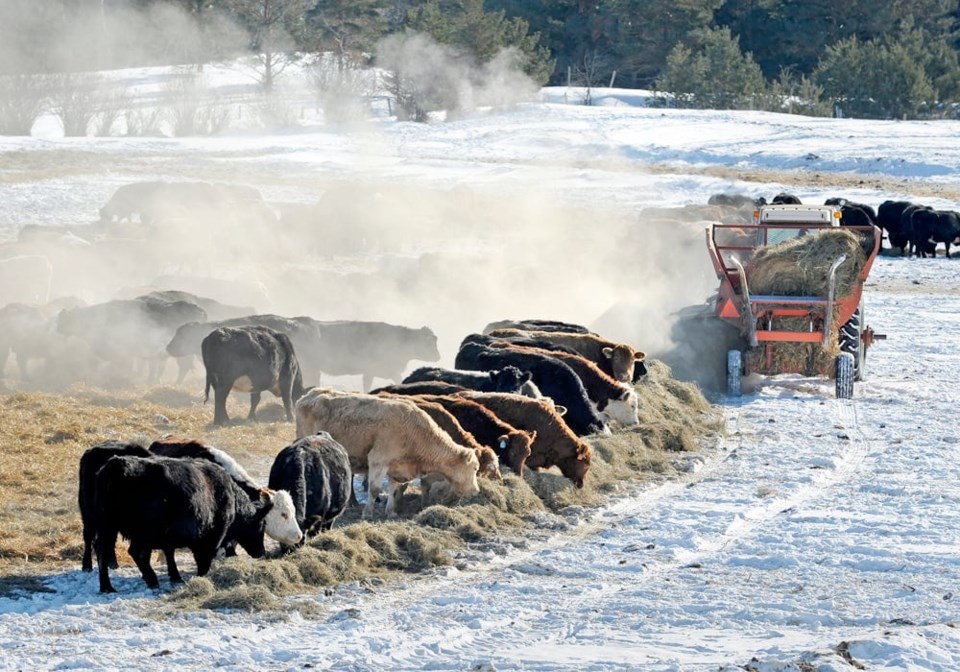SASKATOON — The future of Saskatchewan’s livestock industry depends on the entire agricultural sector working together, said producers during an April 5 livestock summit.
“Fight for me to stay in the business,” urged Levi Hull, a producer from Willowbrook who is also a Saskatchewan Cattlemen’s Association director.
Speaking during the Agricultural Producers Association of Saskatchewan summit, Hull said cattle producers are huge customers of grain farmers.
“One thing I’m going to tell you guys as grain producers… every cow that leaves this country is one less bid on your feedgrain,” he said.
“In any given year, 30 to 35 percent of your entire production goes into feedgrain.”
Hull said demographics and labour issues are challenging an industry that is critical to agriculture as a whole and one that he loves.
“I need you grain guys to go to bat for me because it will indirectly affect your bottom line as well,” he said, referring to the continuing loss of cows.
Hull and APAS vice-president Bill Prybylski live about eight kilometres apart. Hull already buys straw from Prybylski and said more producers have to do the same.
He said he’d like to see APAS promote that integral relationship.
Prybylski said the idea of the summit was to bring together producers, industry and academics to identify issues and start the conversation to work toward solutions.
Business risk management programs need a tune-up, said participants, to put livestock producers on a more equal footing with grain producers. Crop insurance premiums are cost-shared but livestock price insurance premiums are not.
Hull said SCA is looking at how cost-shared cost-of-production insurance might work.
Merek Wigness, a bison producer near Cadillac, Sask., said he’d like to see the various animal agriculture associations in the province work together on a public relations campaign to fight back against the vilification of animal agriculture. He said biodiversity is something everyone wants and it’s actually the main product from his grazing land, even though he doesn’t get paid for it.
APAS director Kevin Gilbert ranches and feeds cattle in the Cypress Hills and said the summit was an example of how organizations and producers should better communicate and work together.
“I think we’ve got to do a better job of building up each other’s sectors,” he said. “We’re competing for each other, not against each other.”
Gord Schroeder, executive director of the Saskatchewan Sheep Development Board, said he was the “black sheep” of the livestock industry.
“We have a real struggle to be involved in policy-making,” he said.
The industry is small relative to cattle but has a role in multi-species grazing and controlling noxious weeds. Schroeder said while he understands the focus on cattle, the industry can’t forget about the others, particularly when it comes to access to capital. Some farms have more than 5,000 ewes, he said, and the sheep business is notable because the average age is about 35.
“There’s a whole other generation of farmers that want to stay in farming,” he said.
Julie Mortenson from the Nokomis area said fighting between cattle producers and grain farmers has to stop.
“Obviously we can see over the fence,” she said. “They’ve gotten noticed by lobbying heavily.”
Teaming up could result in a better situation for everyone, she said.
APAS president Ian Boxall, who is a grain producer at Tisdale, said the federal government is currently promoting grasslands through television commercials and is essentially taking credit for what cattle producers have done to maintain it.
Boxall said livestock fit into the federal environmental agenda and producers should get the recognition they deserve.
He said APAS, together with the other organizations, will now develop policy proposals for governments.
“I want to fight. We want to fight. And that’s why we’re doing this,” he said. “Success in agriculture doesn’t work without success in every sector.”




